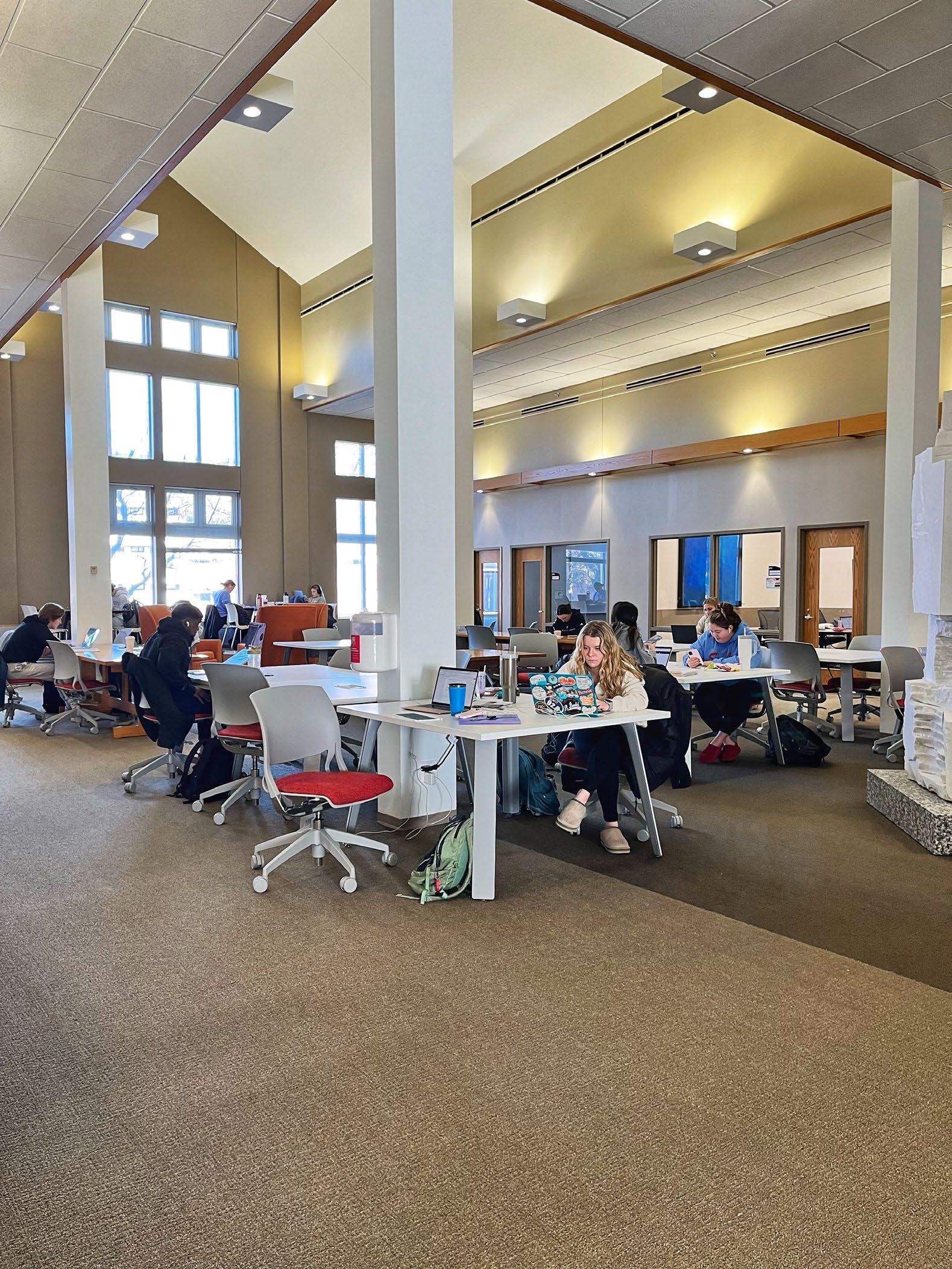
Libraries & Archives








Strategic Highlights
During Fiscal Year 2024 (FY24), the Libraries & Archives undertook the creation of a rolling strategic plan to guide our work. Our overarching goals are:
Goal 1: Care
• The Libraries & Archives will contribute to student, faculty, and staff’s sense of belonging by fostering a supportive community that prioritizes inclusion, connectedness, and the well-being of all.
Goal 2: Scholarship
• The Libraries & Archives will encourage inquiry and inspire scholarly discourse through our services, teaching, research, and collections.
Goal 3: Creativity
• The Libraries & Archives will nurture a sense of wonder and curiosity and provide programming and resources that encourage experimentation and ingenuity.
Goal 4: Practice
• The Libraries & Archives will sustain a growth mindset grounded in reflection, collaboration, and continuous learning. These four goals set the framework for the eleven initiatives that the Libraries & Archives will focus on over the next fiscal year.
We are currently in the process of developing assessment plans for these initiatives that will measure both the Libraries & Archives’ impact on our own goals but also the institutions’ key performance indicators.
Scholarship, Service, and Professional Development Highlights
Librarians and library staff have engaged robustly in scholarship and service over the 2024 fiscal year, as well as participated in targeted professional development opportunities

intended to expand our skills and support the scholarly and creative efforts of our community.
Institutional Service
• Academic Innovation Steering Committee
• Administrative Professional Development Committee
• Center for Teaching and Learning Advisory Board
• Department Chair and Program Directors
• Facilities Master Plan Sub-Committees
o Academic Facilities
o Athletics Programming
o Campus Accessibility
o Student Success Programming
• Instructional Technology Day Planning Committee
• Joint Faculty Assembly General Education Curriculum Committee
• Joint Faculty Senate
• Office of Undergraduate Research and Scholarship Pathways Advisory Committee
• Phi Beta Kappa, Theta of Minnesota Chapter
• Program Assessment Committee
• Residential Student Experience Committee
• Undergraduate Research Faculty Advisory Committee Professional Service
• Association of College and Research Libraries College Libraries’ Section Best Practices Committee
• Association of College and Research Libraries College Libraries’ Section Executive Committee
• Council of Academic Library Directors Annual Meeting Committee
• Minnesota Library Association Academic and Research Libraries Division
• Minnesota Library Association Institute for Leadership Mentor
• MnOBE Reference and Instruction Planning Committee
• MnOBE Technical Services Group
• Music Library Association Digital Humanities Interest Group
• Music Library Association Technical Reports and Monographs Editorial Board
• Tipasa Community Leader Grants
• Institute of Museum and Library Services Maker Literacies Sub-Award

• National Endowment for the Humanities Grant to Support Great River Covenants Project Presentations & Publications
• (forthcoming publication; anticipated August 2024) Gewirtz, Sarah, Elijah Browne, and Ethan Wittrock. The 'For/Against/Neutral' Assignment. In Amy M. Damico and Melissa M. Yang (Eds.), News Literacy Across the Undergraduate Curriculum: Considerations for Librarians and Faculty. Bloomsbury.
• (upcoming) Butorac, Kelly, and Ethan Wittrock. “The Spot-the-Difference Assignment.” Presentation accepted for the Minnesota Learning Commons’ MnLC Learning and Technology Summit, Saint Cloud State University, St. Cloud, MN. August 8, 2024.
• Finn, Bonnie. “DH in the Classroom: Alternative Fashion Trends in Omeka.” Lightning talk and demonstration. Presented at the 2024 Day of DH, Carleton College, Northfield, MN. May 31, 2024.
• Finn, Bonnie. “Radio at Saint John’s University: Antennas to Long-Playing Legacies.” Presented at the 2024 ARSC Conference, Minneapolis, MN. May 15-18, 2024.
• Finn, Bonnie, and Amelia Cheever. “DH in the Classroom: Alternative Fashion Trends and Omeka.” Panel: In Support of Digital Humanities. Presented at the ARLIS/NA Conference, Pittsburgh, PA. April 1-6, 2024. (We have been solicited by the editor of the peer-reviewed journal Art Documentation to submit this as an article.)
• Finn, Bonnie. “AI and Images: A Canvas Module and LibGuide for Art Studio Classes.” Panel: AI Among Us: New Approaches to Library Instruction. Presented at the ARLIS/NA Conference, Pittsburgh, PA. April 1-6, 2024.
• Finn, Bonnie, Laura Thompson, Jessica Abbazio, Sarah Ward, and Carol Lubkowski. Panel: Discovery in the Stacks: A Primer (or Refresher!) for Stacks Maintenance in Music and Arts Libraries. Presented at the 2024 Music Library Association Annual Meeting, Cincinnati, OH. February 28-March 2, 2024. (We have been solicited by the editors of the peer-reviewed Music Reference Services Quarterly to submit this as an article).
• Larson, Annie. Thing 16. Linked data: Impact for Public Services. Part of Minitex’s self-paced online learning program 23 Linked Data Things. July 2023.
Professional Development
• Creative Commons Certificate for Librarians
Operating Highlights
The Libraries & Archives continue to seek meaningful ways in which our operations can best support the success of our students, faculty, and institutions. Operational successes of particular interest include:

• The inclusion of librarians in academic courses continues to grow. In FY24, our librarians taught 422 sessions (an increase of 13% from the previous year) to 230 courses (an increase of 27% from the previous year). Based on course enrollment, our instruction reached 4,145 students (this number does include teaching some individual students multiple times but in different courses).
• During the 2025 fiscal year, this team will be focusing on how to best measure the impact on student learning and engagement that is accomplished through our heavy involvement in academic courses.
The Libraries & Archives lent approximately 6,000 items to other institutions in FY24, a testament to the strength of our collections. In turn, we borrowed 5,126 items from other institutions. Our annual budget to support ILL (shipping and copyright costs) is approximately $15,000. Using the average cost of an academic book, it would cost the institutions approximately $300,000 to purchase all the materials that we are able to acquire for our faculty, students, and staff through interlibrary loan.
The number of courses to which our librarians provided instruction increased 27% in FY24.
Purchases of print materials occur in two different ways - selection based on our collection development guidelines and through POD (an item requested by a member of our community is purchased rather than borrowed from another institution).
• During FY24, we purchased 581 items via POD, 100% of which have been checked out at least once. Of the 267 items purchased via POD in Fall 2023, 59% have been checked once, while 41% have circulated between two and five times.
• Comparatively, circulation of print materials is declining (this is a national trend). Studies over the last several years at academic institutions have shown that it is not uncommon for much of a library’s print collection to never be checked out.
• In upcoming fiscal cycles, we will be exploring how we can best use POD and D emand Driven Acquisition (similar to POD, but for ebooks) to best steward the Libraries & Archives’ materials budget.

During FY24, the Libraries & Archives highlighted opportunities for how we could positively impact course material affordability. This will continue to be a strategic focus for us in FY25. The greatest impact we have had in this area is through the purchase of course materials that are available as multi-user ebooks.
• During the Spring 2024 semester, 348 books were required texts in courses. The Libraries & Archives were able to purchase 76 of those texts (22%) as multi-user ebooks. Assuming an average class size of 19 and using the average cost of an academic book, we saved students approximately $80,000 in that semester alone.
• In FY25, we will continue to explore opportunities to make access to course materials more equitable and affordable, including through the adoption and development of open educational resources and textbook reserves.
The Libraries & Archives are committed to providing our community access to both creative and productivity-focused technologies.
• In partnership with Information Technology (IT), the Libraries & Archives circulates laptops to students on a semester-long basis. A recent survey of those students who used one of these laptops indicated that all who responded believed that the lending program was extremely important to their academic success and that not having one of these laptops would have negatively impacted their ability to complete their coursework.
• During FY25, the Libraries & Archives will be exploring how to expand our lending program to provide access to technologies that may be out of reach financially for our students and also support their ability to engage in scholarly, creative, and entrepreneurial endeavors.
The activities highlighted above make visible the impactful operational work of the Libraries & Archives and how we are strategically building on those successes to meet the needs of our community.
Gretchen Trkay Director of Libraries College of
Saint Benedict and Saint John’s University

The Libraries & Archives are deeply committed to the academic and professional success of our students and faculty , as well as fostering a sense of belonging for our community . In this section, you will find an articulation of our FY24 activities that were focused on this commitment .
Learning & Research
Our Learning & Research team is comprised of six librarians, with additional support from our Collection Development Librarian.
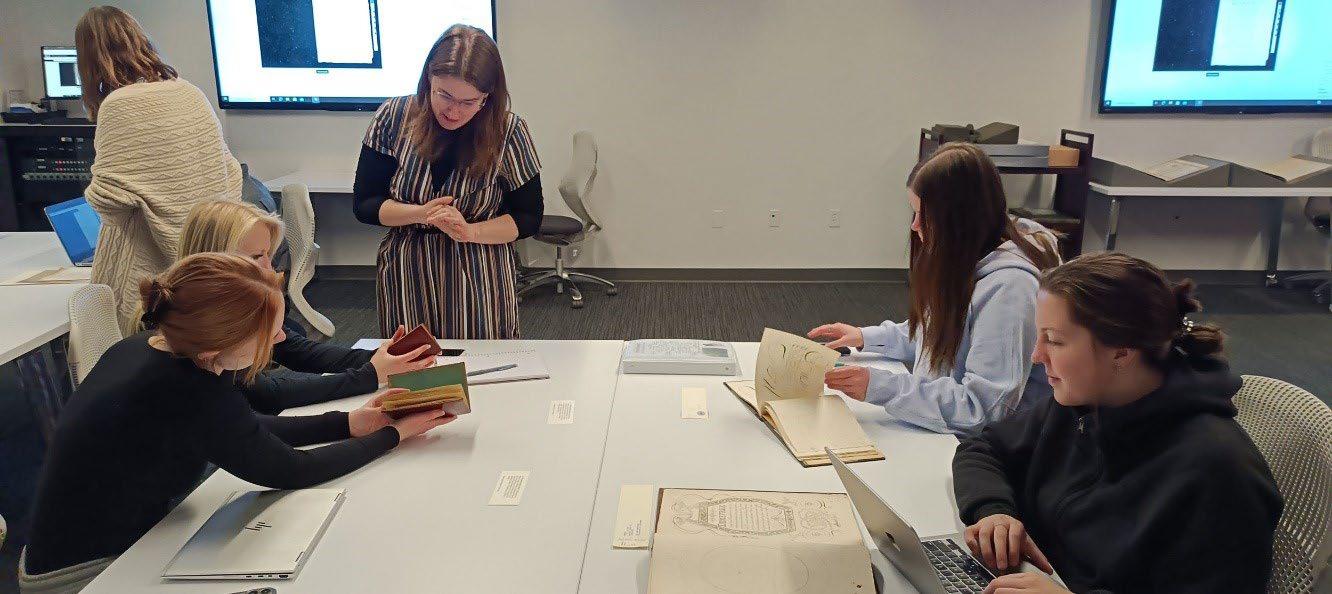
FY24 Statistics at a Glance
• 240+ reference questions
• 391 student research appointments
• 422 in-class instruction sessions across 230 courses or course sections
• 178 sessions (42% of our total) were multimedia assignment sessions that included video editing, podcasting, generative AI, digital humanities, and data analysis tools
o These sessions are almost always offered collaboratively with iTech and prioritize active and applied student learning and the transformative use of technology.
• 4,145 students engaged in a course that involved learning from a librarian (students may have been enrolled in more than one course that included a librarian)

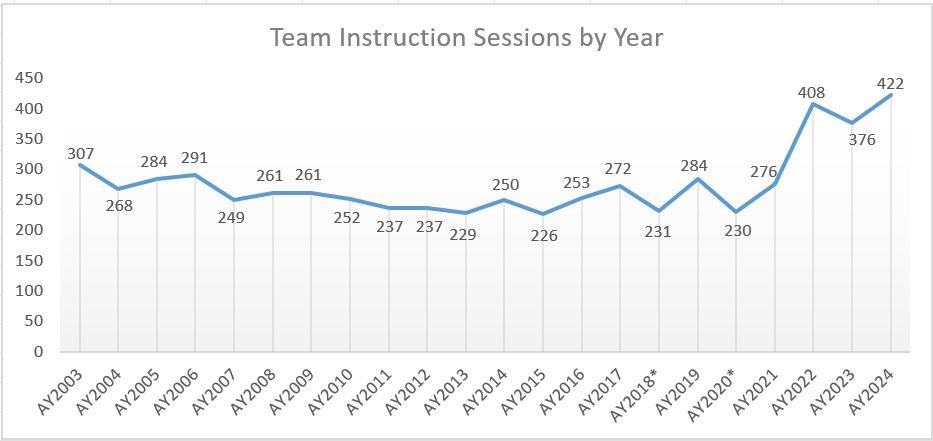
* AY2018 and AY2020 session totals do not include any sessions offered collaboratively with iTech; instead, we tracked the total unique courses/course sections – 21 and 32, respectively – collaboratively supported by librarians and iTech specialists. As a reference point, AY2019's total (284 sessions) included 101 iTech/librarian sessions across 22 courses.
In partnership with Instructional Technology (iTech), the Learning & Research team defined new learning outcomes, aligned with institutional and Integrations Curriculum learning goals, that will anchor our teaching.
Goal 1: Actively evaluate content while also evaluating one’s own biases
• Learning Outcome 1.1: Consciously seek information from a spectrum of viewpoints and sources.
• Learning Outcome 1.2: Critically assess information from all sources.
• Learning Outcome 1.3: Acknowledge that both subtle and overt biases exist, and that content is not always produced for legitimate reasons (e.g., disinformation).
Goal 2: Engage with all intellectual property ethically and responsibly
• Learning Outcome 2.1: Identify and follow the specific intellectual property attribution expectations in the setting in which you are working.
• Learning Outcome 2.2: Reflect on how to effectively and ethically integrate openly licensed content and/or someone else’s intellectual property into your own work (including original and remixed productions).
Goal 3: Produce and share information in collaborative and participatory environments
• Learning Outcome 3.1: Participate conscientiously and ethically in collaborative environments.
• Learning Outcome 3.2: Share knowledge accurately and effectively through content production using appropriate and evolving formats and platforms.
• Learning Outcome 3.3: Translate information presented in one manner to another to best meet a particular audience’s needs.
Goal 4: Develop learning strategies to meet lifelong personal and professional goals

• Learning Outcome 4.1: Recognize that critical thinking depends upon knowledge of a subject and actively pursue deeper understanding through inquiry and research.
• Learning Outcome 4.2: Assess learning to determine both the knowledge gained and the gaps in understanding (i.e., metacognition).
Tiered Model of Learning Support
The Libraries & Archives have prioritized collaborative teaching with faculty that is grounded in course-integrated experiential learning, primarily project-based learning that includes student reflection. To create capacity for our librarians to engage more collaboratively with faculty, we are implementing a tiered model for learning support. These tiers are:
Tier 1: Informational
• This tier includes short introductions by librarians or asynchronous informational content. This is most appropriate for faculty looking for a basic orientation to information literacy (IL) concepts without contextualizing the IL learning outcome into an assignment in partnership with a librarian.
Tier 2: Single Class Active Learning Exercises
• This tier includes pre-created active learning lessons that address elements of the Libraries & Archives’ and iTech’s learning outcomes and are applicable to the outcomes faculty seek for their students. These sessions ask students to evaluate our information ecosystem collaboratively and critically. They also include a reflective component that helps them “connect the dots” between this session and other course content and/or reinforces how what they have learned can apply in other contexts.
Tier 3: Project-Based Assignments
• This tier includes pre-created assignments and curricula, grounded in applied/experiential learning, that address the Integrations Curriculum (IC) Information Literacy learning outcomes, other IC learning outcomes, institutional learning outcomes, and/or course learning outcomes. The curricula are contextualized to the major assignment(s) that students will complete in their courses. Librarians, and iTech staff as appropriate, can co-teach class sessions or coordinate in-class “lab days” to support student learning and assignment completion.
Tier 4: Bespoke Project-Based Assignments
• This tier allows librarians and faculty (and iTech staff as appropriate) to collaboratively develop new assignments and curricula, grounded in applied/experiential learning, that address course learning goals. Depending on the efficacy of the work in meeting student learning outcomes, these newly developed assignments may then be incorporated into Tier 3 for reuse with other classes or subsequent semesters of the same class.
Looking to the Future
Supporting Digital Scholarship

• As part of the Libraries & Archives’ strategic plan we are in the process of creating a service model for supporting digital scholarship, specifically digital humanities and data services. First iterations of this service model are likely to focus on supporting the inclusion of this work in courses, but in the future we would like to determine how best to support faculty research in the digital humanities.
Redefined Job Descriptions
• The Libraries & Archives are also in the process of re-working the job descriptions of the Learning & Research librarians to better reflect the current and future work of this group. Specifically, we hope to make the functional specialties of our librarians more visible to our community.
Assessment of Student Learning
• In the next fiscal year, the Learning & Research team, in collaboration with iTech, will be developing protocols and tools to assess the efficacy of our support for student learning. Ideally, these protocols will include both formative and summative assessments that utilize the artifacts students produce in the courses in which librarians are involved (authentic assessment) and focus on metacognition and reflective practice.
• As the institutions further develop their capacity to use big data to predict student persistence, the Libraries & Archives would like to include our intervention points (both academic and social) to help better understand our impact on student performance, retention, and graduation rates.
Undergraduate Research
• As part of the Libraries & Archives increased focus on supporting student learning through applied and experiential pedagogies, we would like to encourage a more intentional and collaborative role for us in undergraduate research. Below are some initial possibilities about how we might contribute to robust undergraduate research opportunities for our students.
o Course-Embedded
Subject liaisons supporting the research cycle including partnering with faculty to design assignments and curricula that integrate undergraduate research into courses as a high-impact practice. This could include support for course-embedded undergraduate research including in college success and, potentially, IC 100 as an engagement and retention strategy.
Open pedagogy as an extension of undergraduate research.
o Co-Curricular
Subject liaisons supporting research cycle;
Undergraduate research summer bootcamp (research intensive workshop focused on literature reviews, citation management, academic

writing, the research cycle, etc.) that students could participate in before engaging in undergraduate research with their faculty mentors.
o Course-Embedded & Co-Curricular
Libraries and iTech support for creative works completed in the makerspace and/or media studios;
Research poster best practices and design instruction/assistance (we are discussing adding a large format printer/plotter to the makerspace in Clemens that would also help support this work);
Digital identity and author’s rights instruction for students;
Digital humanities/digital scholarship support for students engaging in this type of scholarship;
Training and resources (including tutorials and activities that could be pushed to students in Canvas) around information ethics (proper attributions/citations; Creative Commons licenses; finding and using others’ images/video/content) in student research posters, presentations, theses, etc.
Workshops & Talks series or OURS (Office of Undergraduate Research & Scholars) Week programming: We have offered librarian-led workshops for eScholar students (or other student populations) during the school year.
• Past workshops have focused primarily on citation managers (e.g., Zotero), but we could offer other topics as well (e.g., research data management best practices for student teams or multi-semester projects);
Train-the-trainers initiative to ensure faculty are aware of, and incorporate, best practices with their student research initiatives.
o Administrative
Intentional inclusion of student research projects in the institutional repository (with the approval of faculty mentors) as well as project curation;
Multi-disciplinary student research open-access journal with student run editorial board;
Event, exhibit, and administrative support from Stacy Penk (Libraries’ office coordinator) for Scholarship and Creativity Day and other undergraduate research activities;
Physical library locations for presentations, thesis defenses, award receptions, displays of student research artifacts, etc.
Programming such as an undergraduate iteration of 3-Minute Thesis.

Apply for McNair Scholars TRIO grant (the next application deadline is July 2027).
With the assistance of external funding provided by the University of Texas at Arlington and the Institute of Museum and Library Services, we were able to add several creative technologies to the Clemens Makerspace including two laser cutters, a vinyl printer/cutter, a sewing machine, a heat press, a vacuum form, and a CriCut Maker 3. The expansion of this technology infrastructure will allow students to explore their potential as creators in academic, co -curricular, extra-curricular, and entrepreneurial contexts.
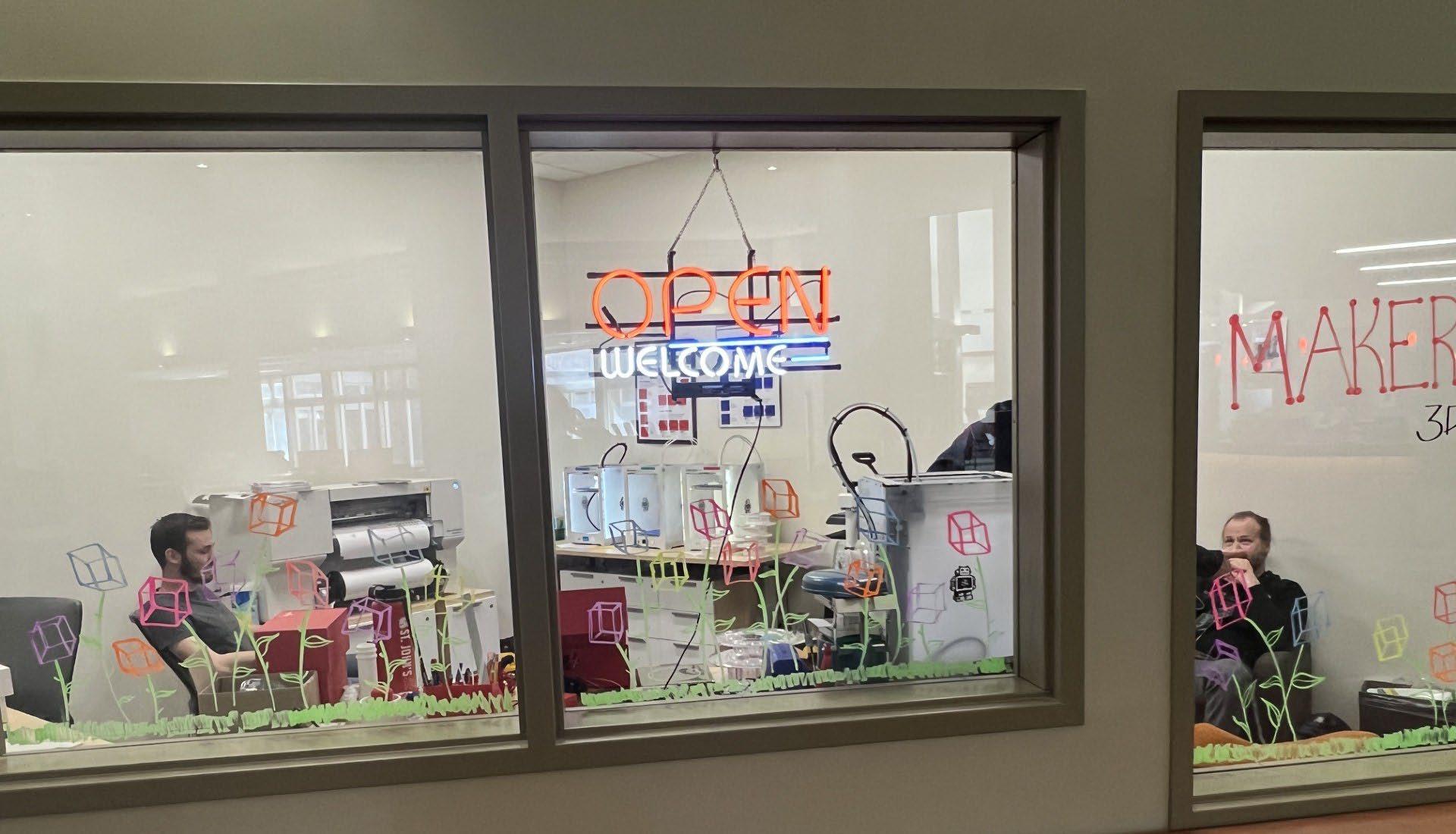
During the upcoming fiscal year, our focus for the makerspace will be to develop a sustainable model for:
• Student staffing;
• Providing access to the consumable supplies required to create;
• A comprehensive series of workshops and how-to guides;
• Assessable inclusion of making in courses that demonstrates impact;
• A web presence that makes visible all the above.
We will also be expanding the footprint of Clemens’ creative environment to include the entirety of the East Wing.

The cost of textbooks has increased significantly over the last two decades, often functioning as a barrier to student success. Nationally, it is not uncommon for students to drop a course because they cannot afford the assigned texts or to choose to continue with a course without purchasing the required materials. Academic libraries have been active partners seeking to remove this challenge for students.
Current Status
During FY24, the Libraries & Archives reinvigorated our work to help make course materials more affordable for students. Our most successful iteration of this work has been the provision of multi-user ebooks that can be alternatives to the purchase of a required course book. Not only is the overall spend much lower when the library licenses one ebook for an entire course, but everyone directly benefits economically from this arrangement. We’ve been doing this for some time, increasing gradually the number of faculty who have adopted the practice of checking with the library about multi-user eBooks in course preparation.
• In the Spring 2024 semester, 348 books were required texts in courses. The Libraries & Archives were able to purchase 76 of those texts (22%) as multi-user ebooks. Assuming an average class size of 19 and using the average cost of an academic book, we saved students approximately $80,000 in that semester alone.
In the upcoming fiscal year and beyond, the Libraries & Archives would like to invite a broader institutional conversation about how we might make course materials more affordable for students. Strategies often employed in this work include open educational resources, open question banks, open pedagogy, library licensed content, and textbook reserves. To be most effective, we need to identify an institutional solution that compensates and incentivizes faculty to contemplate how they might make the materials they select for their courses more affordable for students.
The Libraries & Archives’ engagement work is intended to contribute to students’ sense of belonging at St. Ben’s and St. John’s. Students with strong interpersonal networks are more likely to persist and graduate, especially if they can rely on those connections when they meet challenges. Libraries are uniquely positioned between students personal and academic lives and our facilities can often function as a third space where students can engage with their peers, new ideas and skills, and simply rejuvenate.
Current Status
Although the Libraries & Archives have been actively engaged in the academic lives of students, this fiscal year we began to explore how we can support the student experience holistically. We hosted 15 events as part of which 261 students participated (80 first year students; 65 sophomores; 57 juniors; and 59 seniors). The top three events were:

• Game Night (November) – 50 students
• Taylor Swift Event (April) – 30 students
• Miniature Zen Gardens (March) – 41 students
Additionally, we did four book discussions this past academic year as part of which approximately 40 students participated:
• Banned Books Week
o Flamer by Mike Curato
• Native American Month
o Firekeepers Daughter by Angeline Boulley
• Blind Date with a Book
o Heartstopper by Alice Osman
• April
o Maus by Art Spiegelman
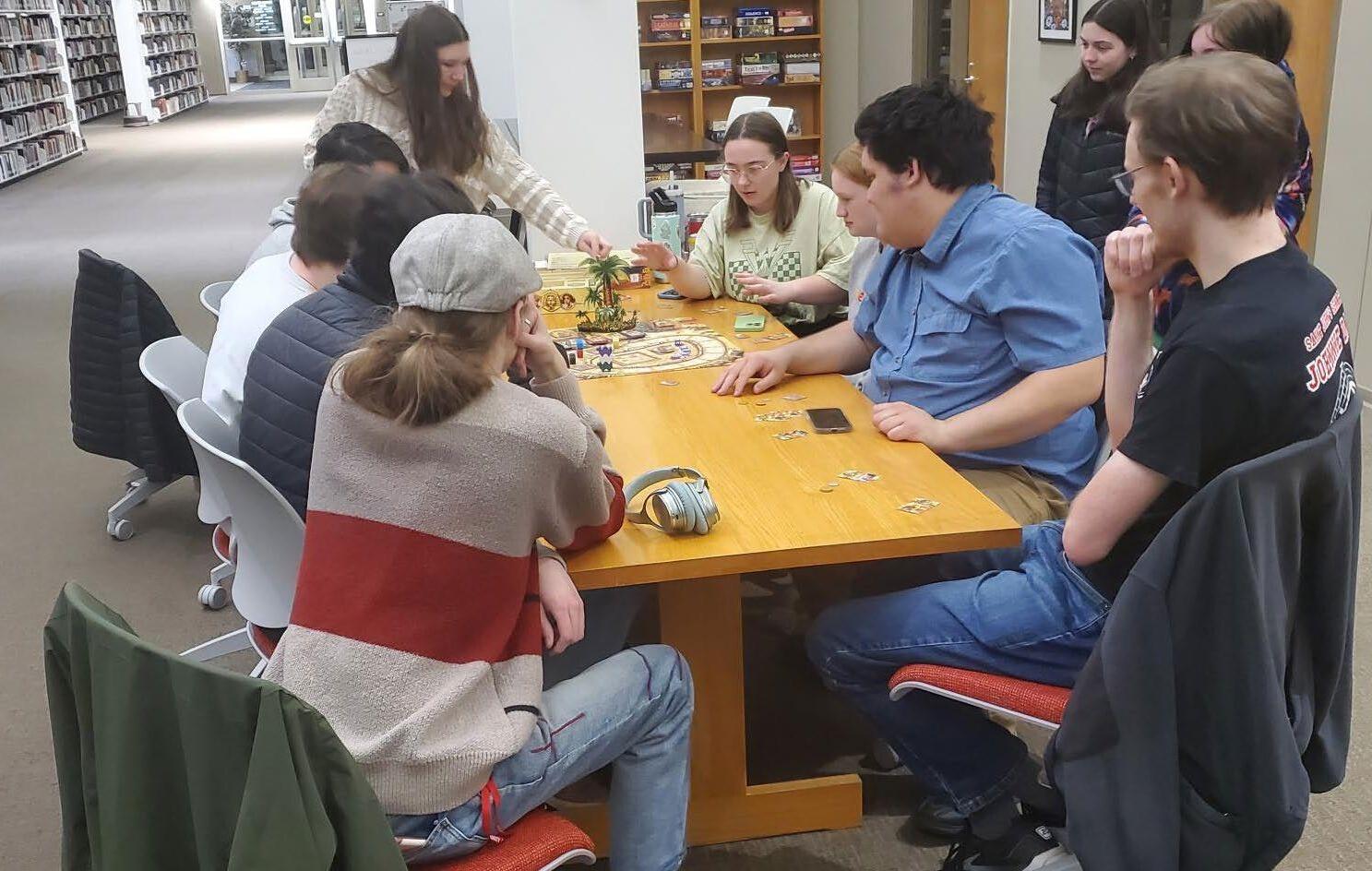
As we continue to expand on the student engagement programming we provide, we will focus on growing the collaborative relationships with other institutional offices and student organizations to provide these opportunities. Additionally, in FY25 we will convene the inaugural Libraries & Archives Student Advisory Council. This group of students will act as a voice for their peers that helps guide the continued development of our services, collections,

and spaces. Impact assessment of our student engagement work will also be a priority in the upcoming year.
Student employment is also a significant engagement point for the Libraries & Archives. As part of our strategic plan, in FY25 we will be mapping transferable and career skills to our student positions. Student employees will be asked to reflect on their work experiences and practice discussing how work in the Libraries & Archives has better prepared them to be successful once they graduate.
In Spring 2025, the Libraries & Archives and Information Technology will be administering the MISO survey. Last administered pre-COVID, the purpose of this survey will help us determine how well we are meeting the known needs of our community and to identify unarticulated needs. The results of this survey will serve as a benchmark for comparison to peer and aspirational institutions as well as our future self.

Over 97 % of the Libraries & Archives non - compensation expenditures are dedicated to collections and library systems, with over 8 2 % of our non - compensation budget specif ically directed toward licensed digital content and the software th at makes our content discoverable and accessible .
Successfully managing our collections requires a deep understanding of institutional context and mission, the changing environment of information resources not only from the marketplace, but also from the user perspective, and is predicated on careful listening, nimbleness of thought, a fair amount of deliberation, and a willingness to let go of long-held practices.
The following criteria are used in considering materials for addition to the collection:
• Relevance to curriculum
• Appropriateness to primary clientele (language, format, audience, reliability, etc.)
• Favorable reviews
• Included in subject bibliographies or other lists of appropriate material
• Author/publisher reputation
• Cost
• Relationship to items currently in the collection or collection strengths
• Importance to a field or discipline
• Organization, indexing, scope, currency, and accuracy
• Author is from a marginalized group where inclusion of the work would help to build a more fully representative collection that includes diverse perspectives
Due to the large percentage of the Libraries & Archives’ budget that is dedicated to purchasing licensed content, we are vigilant in monitoring use of these resources to make certain we concentrate our funds where they can be most effective. Article views for our primary journal vendors (Elsevier, Sage, Springer, and JSTOR – just a few of the vendors from whom we purchase access to licensed content) were 86,124. With the average view price for an article accessed independent of a library being approximately $35, it would cost our individual researchers $3,014,340 to access this same content. We provide that access for a small fraction of this cost through library subscriptions and Interlibrary Loan.
The Libraries & Archives create, host, preserve, and/or disseminate content created by our community. Additionally, we collect and preserve unique materials that relate to the mission and academic foci of our institutions. This typically happens through our archives (nondigital), institutional repository, and Vivarium. Sharing the scholarly and creative content

that is the product of our faculty, students, and staff is essential to making visible the unique contributions our institutions have on the world.
The institutional repository (IR) contains the open licensed scholarship of our community. In FY24 the use of our institutional repository included:
• 372 new works published on Digital Commons, bringing the total to 8,542 total works
• 411,948 downloads, from 223 countries (an increase of 68% over last year)
• 396 content streams (streaming media)
• 27,485 views on our YouTube channel (335.8k total)
• 146 new YouTube subscribers (1.6k total)
Institutional Repository (DigitalCommons) Downloads
The Archives' current mission is to collect, preserve, and make available materials that illustrate institutional history and promote knowledge and understanding of the history and heritage of Saint Benedict's and Saint John's. We accomplish this by making an amazing amount of information discoverable and available in digital and accessible formats. To this end, we completed the migration of content to ArchiveSpace this year.

We also work with researchers one on one and by presenting to community groups. In FY24, we have supported access to the college and university archives by many different groups.
Amount of Research Support by Year and Patron Group
Beginning in Spring 2025, we will evaluate the mission of our Archives and determine the feasibility of merging this mission with our goals related to student learning, student engagement, and use of our other distinctive collections, e.g. artist books. We will also be exploring the possibility of moving the artist book collection to the BAC Library so that it is in closer proximity to the Book Arts Studio and those that most frequently seek to access that collection.

This year we set the foundation for revamping our web content through card sorting exercises with a random sample of students and faculty, a deep dive into what analytics and heat mapping data tells us about current use patterns, and professional development into UX best practice. This research was used to develop a wireframe to discuss with stakeholders in June and July and will be used to inform our website update in July and August in preparation for the 2024/25 academic year.
As our major systems come up for renewal, as a matter of course, we consider the current state of the industry and investigate alternatives for both innovation and cost savings. With stagnant budgets and inflationary increases in all of our major systems, we can afford less every year, so system renewals give us an opportunity to possibly reduce our spend on systems. Our Integrated Library System (ILS) contract with OCLC is up for renewal next year (June 2025) so an investigation of alternatives was done this year. We are in negotiations on our OCLC contract after finding the alternatives are not attractive.
500 1,000 1,500 2,000 2,500 3,000 3,500 4,000
A committee investigated the feasibility of merging our Institutional Repository (Digital Commons) with our Digital Archival Management System (CONTENTdm) and recommended not proceeding due to loss of functionality. With an eye toward balancing innovation, price, and service to our students and faculty another potential platform was considered but without significant cost savings relative to additional features it was decided to revisit potential platform evaluation in the future.